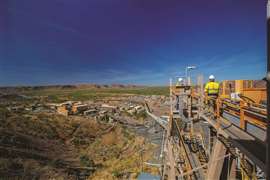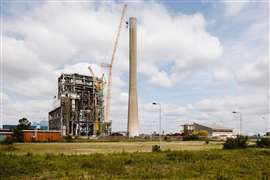Read this article in 中文 Français Deutsch Italiano Português Español
‘To build better infrastructure, we need to build trust first’
27 November 2024
 Image: Yury Gubin via AdobeStock - stock.adobe.com
Image: Yury Gubin via AdobeStock - stock.adobe.com
Dr Kerry Bobbins is on a mission to build better infrastructure. Head of the Enabling Better Infrastructure programme at the Institution of Civil Engineers based in London, UK, she has been talking to senior government officials all over the world about how to build infrastructure more successfully. Two crucial elements are having a clear vision across government departments and being prepared to share what has worked well – which is why, she argues, communication and trust are key ingredients for successful projects.
How do you plan infrastructure?
This is a huge question, and not one I am going to attempt to answer in a one-thousand-word piece. Infrastructure is complex, planning it is too.
Planning infrastructure strategically unlocks benefits for the economy, society, and the environment. Therefore, getting things right at the start of the infrastructure lifecycle is fundamental to everything that follows.
This is at the heart of the programme I lead at the Institution of Civil Engineers, Enabling Better Infrastructure (EBI).
In a nutshell, EBI brings together independent specialists with deep, wide-ranging experience to support governments in putting best practice principles for strengthening strategic infrastructure planning into practice.
Since the EBI programme started five years ago, it has engaged with over 200 leading stakeholders responsible for planning and prioritising infrastructure. It has convened conversations with more than 30 senior government officials from all over the world. And it has gathered learnings from at least 15 country’s governments. This is all part of its non-profit remit.
If there is a recurring theme that has stood out from these conversations, it is the importance of building trust.
So, let’s ask a different question – how do you build trust as part of the strategic infrastructure planning process?
We can begin to answer this question by looking at EBI’s core principles. These eight principles set out the key elements governments need to consider when establishing a planning process.
The principles are not a roadmap to strategic planning – it’s more helpful to think of them as a foundation for how to plan infrastructure well, but they are flexible enough to allow for country-specific requirements to be factored into the process.
All the principles are interconnected, and equally important, but trust is particularly relevant when we consider the first, ‘create a clear vision’, and the seventh, ‘establish relationships for long term change’.
Let’s dive into why.
Create a clear vision
A clear vision helps streamline buy-in from the government and the country as a whole to support infrastructure decision-making.
One of the things I have found surprising in my conversations with senior stakeholders and government officials is how rarely cross-government buy-in in a programme or project exists.
Within industry, it’s understood that infrastructure is intersectional. At the ICE, we often talk about needing a systems-based approach to infrastructure to improve outcomes. For example, if your goal is to increase people’s use of public transport, you can’t just focus on improving rail infrastructure, you also need to think about things like buses and ticketing.
Equally, when planning water and sanitation services for example, it is essential to include treasury departments, water and sanitation departments, energy departments (treatment plants are energy intense), and environmental departments (as there is likely to be some kind of environmental impact).
Planning across within and across sectors with a systems-based approach in mind requires including other stakeholders.
In our conversations with governments, we often see that the infrastructure they are planning is interdependent, but the planning approach is siloed. Different departments and teams may have different objectives, budgets, regulatory bodies, etc. and they are not speaking to each other at the planning stage.
When EBI begins working with a new government, we’re often encouraging it to do something it has never done before – present a clear vision for infrastructure for the future and find opportunities for the entire government to buy into it.
Establishing a clear vision for everyone helps clarify objectives and define what success looks like for all. This is not always the norm.
In a recent EBI-organised session with high-level government officials, six country level entities were in the room together for the first time.
It may sound trite, but making everyone feel like they’re on one team, working towards a much bigger common goal is a solid foundation to build trust.
Establish relationships for long term change
Getting everyone in a room together helps create a clear vision. Delivering on it requires relationships and trust with all stakeholders.
When I first began working in the infrastructure policy space, no one wanted to talk about failure. If failure was acknowledged, the perception seemed to be that no one would ever trust that government to deliver anything well.
 Dr. Kerry Bobbins (Image courtesy of Institution of Civil Engineers)
Dr. Kerry Bobbins (Image courtesy of Institution of Civil Engineers)
I’m happy to say we seem to be moving beyond that. I would even go so far as to say that governments are now openly acknowledging that they do not have all the answers and are actively trying to engage in conversation with citizens to collect their thoughts and ideas and identify needs. This really shows governments are dedicated to getting things right.
Part of getting things right requires building trust with external or independent specialists and the public.
In addition to the strategic planning advice its network of experts offer, the EBI team also gathers lessons and insights from its network in a bank of best-practice examples.
Two examples of how trust has been built with stakeholder groups from the EBI bank are:
Canada has used public engagement to better understand priorities for the country’s first national infrastructure assessment.
Norway used a two-stage process to select and appraise projects as part of its National Transport Plan. The process incorporated input from a wide range of stakeholders.
Here in the UK, a social infrastructure example: As part of a comprehensive sentencing review, the government has issued a call for evidence from ‘all who have an interest in this area’ and encouraged respondents to ‘be ambitious’ and share ideas that ‘challenge current thinking, are innovative, or which spotlight best practice and how it can be extended, so we can build a justice system which is sustainable now and in the future.’
There’s also a growing realisation that governments do not need to invent these planning processes from scratch – they can learn from each other.
This is where a programme like EBI can have tremendous impact – its specialists are well established in the industry, have worked all over the world in many policy environments, and have the support of a recognised institution behind them; they are already trustworthy in many governments’ eyes.
Of course, changes like this take time to implement, and even more time to bear fruit. There is still much to do, and trust is something to be cultivated and maintained over time.
While governments around the world continue to face many challenges, it is encouraging to see the efforts that are being made to improve planning for the outcomes it can provide.
Trust is an essential ingredient for continued success.
Dr Kerry Bobbins is the head of the Enabling Better Infrastructure programme at the Institution of Civil Engineers
STAY CONNECTED


Receive the information you need when you need it through our world-leading magazines, newsletters and daily briefings.
CONNECT WITH THE TEAM











